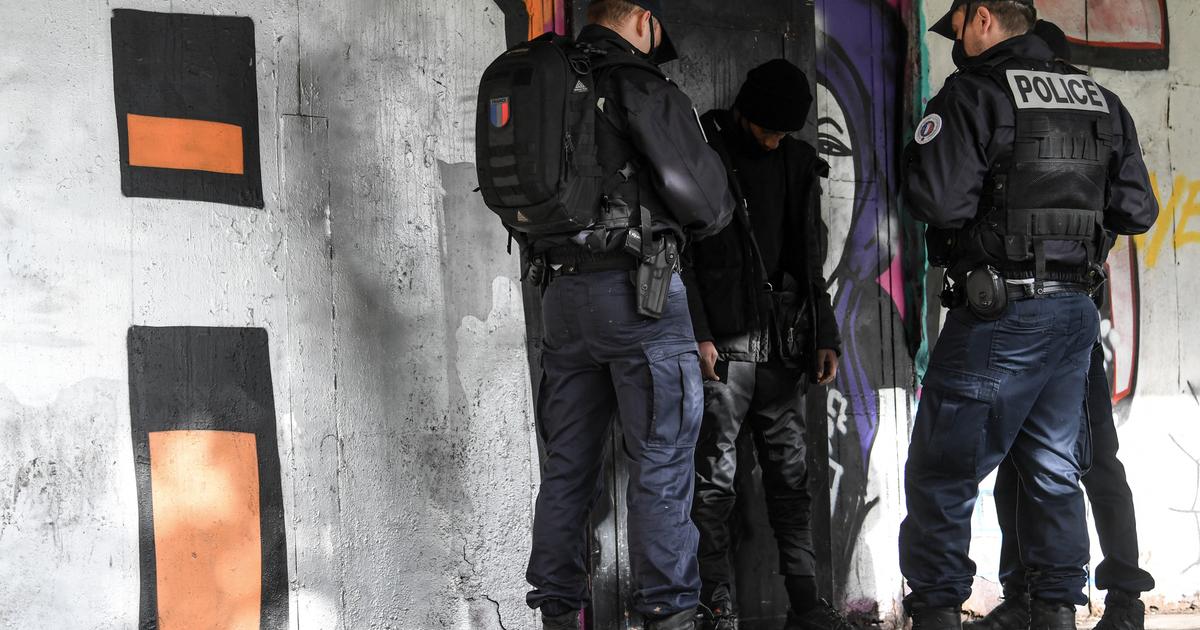Icon: enlarge
Police officers at a control in Dresden (symbol picture)
Photo: Sebastian Kahnert / dpa
After months of controversy, the grand coalition has agreed on a police study.
At the insistence of the SPD, Interior Minister Horst Seehofer (CSU) promised an investigation that would, among other things, deal with racism in the public service, including the police.
Seehofer said that right-wing extremism and racism must be met with "zero tolerance".
At the same time, the study will deal with difficulties in everyday life for security officers.
After right-wing extremist chat groups were uncovered by police officers in several federal states, the SPD demanded a comprehensive racism study from the police.
Seehofer, on the other hand, argued that it was wrong to focus solely on the security authorities when investigating this phenomenon.
This puts the police under general suspicion.
While an issue of conflict within the coalition has been cleared away with the agreement on the study, the debate over the investigation is far from over.
There is cautious encouragement from the interior ministries of the federal states as well as from the Greens and the FDP.
In contrast, the left and politicians of the CDU are critical.
"I am skeptical of how helpful this study will be," said Martina Renner, Deputy Head of the Left, SPIEGEL.
Independent studies of right-wing attitudes and structural racism in the police are necessary.
"However, to shift the focus of it to violence against police officers or experiences in everyday police life is a transparent diversionary maneuver," said Renner.
Racism is just as little rooted in the behavior of those affected as anti-Semitism in the actions of Jews.
In the compromise with the SPD, Seehofer takes up a proposal from the police union (GdP).
She advocates an "investigation into everyday police life" in order to document pollution.
In addition, it is to be examined why "prejudices against certain social groups" sometimes become entrenched in individual officials and what can be done about it.
GdP Vice Jörg Radek told SPIEGEL that it was now possible to "analyze everyday police operations against the background of right-wing extremist cases in agencies, at the federal and state levels".
In this way, it could be clarified what causes there are extremist behavior and thinking, why prejudices against certain social groups may become entrenched and one person can withstand the high stresses of everyday work, the other apparently less resilient.
A sustainable study must contain clear, comprehensible solutions, said Radek.
The danger that the study that has now been announced will be a hodgepodge and therefore no longer meet any claim seems great to me - at least if it is not a study of several years. "
Serap Güler (CDU), State Secretary for Integration in NRW
The CDU politician Serap Guler, State Secretary for Integration in North Rhine-Westphalia, expressed doubts about the planned investigation.
Although it was good that there was an agreement, Guler told SPIEGEL.
"But as good as the compromise sounds at first, the risk that the study that has just been announced is a hodgepodge and therefore no longer does justice to any claim seems great to me - at least if it is not supposed to be a study of several years"
The connection with the everyday experiences of the police also arouses the feeling that "anti-constitutional attitudes should be justified somehow".
But that must be avoided, said Guler.
The Thuringian CDU regional deputy and former police officer Raymond Walk was also skeptical.
There are still many open questions.
"The question of the study belongs to the state interior ministers," Walk told SPIEGEL.
Irene Mihalic, domestic political spokeswoman for the Green parliamentary group and herself a police officer, described the announcement as a success in the discussion about the police.
The central question is "how well the public service lives up to its claim not to tolerate any group-related misanthropy or right-wing extremist or other anti-constitutional attitudes and practices," Mihalic told SPIEGEL.
"If the civil servants' everyday experiences are also included in the analysis, I think that makes sense, especially since clues for typical radicalization processes can be found here."
The exact question and the later design of the study should be left to independent scientists, said Mihalic.
The FDP also rates the grand coalition's plan positively.
"A study on racism within the police is long overdue in view of new incidents almost every week," said Deputy FDP parliamentary group leader Stephan Thomae to SPIEGEL.
"Obviously, however, your own coalition partner first had to face Federal Interior Minister Seehofer in order for him to give up his stance of refusal."
Thomae demanded that the study should be tackled quickly and should not be "unnecessarily delayed by additional objects of investigation".
Seehofer must clarify when and how the study will be commissioned and when results can be expected.
Interior Minister Pistorius and Stahlknecht welcome the planned study
Lower Saxony's Interior Minister Boris Pistorius (SPD) welcomed the announcement from Berlin.
"For a long time I have spoken out in favor of investigations, particularly on the reasons for racial profiling and daily police work," Pistorius told SPIEGEL.
"This is an important step that will benefit our police in particular and will strengthen the trust that we have rightly placed in them."
Pistorius had recently announced a single-handed police study.
The investigation planned by the federal government is "a suitable instrument to make the German police better and more democratic-resilient in the federal concert."
The Interior Minister of Saxony-Anhalt, Holger Stahlknecht (CDU), also praised the research project.
"In our society and with the police there is no place for xenophobia, anti-Semitism and extremism," Stahlknecht told SPIEGEL.
"Nor will violence and hatred against police officers be tolerated."
Therefore it is also important to examine "how the influences on the work of the police officers have changed".
Saxony-Anhalt recently joined the study planned by Lower Saxony.
Icon: The mirror
mes / hba / til / wow / cte / dpa







/cloudfront-eu-central-1.images.arcpublishing.com/prisa/VMXSEROZRFLUO5THK6ZMQ2QGPA.jpg)






